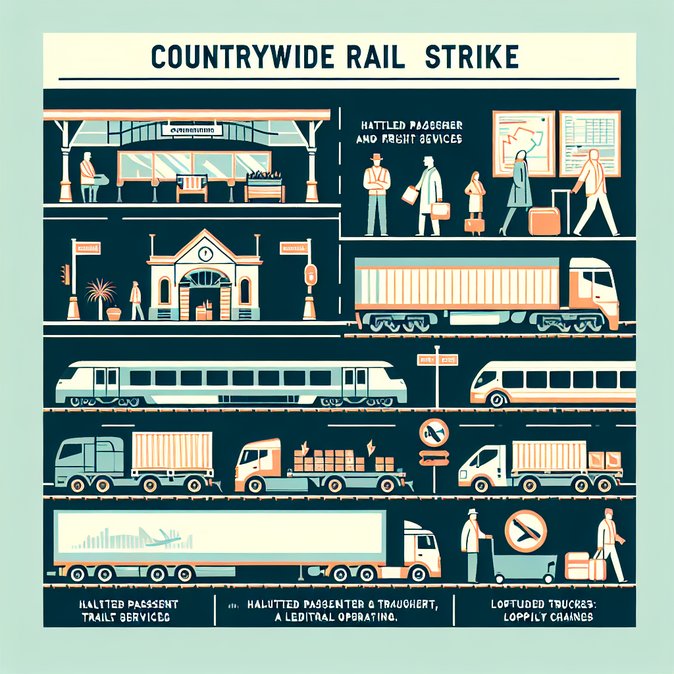
Belgium’s rail sector is bracing for its most disruptive work stoppage since 2022 after the autonomous train-drivers’ union SACT confirmed on Monday, 28 October, that it will join the 72-hour strike already announced by the three largest rail unions (ACOD-CGSP, ACV-CSC Transcom and VSOA-SLFP).
The walk-out is scheduled to begin at 22:00 on Sunday 23 November and run until 22:00 on Wednesday 26 November, paralysing the entire passenger and freight network operated by state-owned SNCB/NMBS as well as Infrabel’s signalling centre. Union leaders say the action is part of a broader cross-sector protest against what they call the federal government’s “authoritarian” labour-market reforms, which include plans to lengthen reference periods for calculating working time and to restrict early retirement pathways.
Business impact will be substantial. Belgian Rail handles roughly 800,000 passenger journeys and 180 freight trains per weekday; many commuters into Brussels’ EU and corporate districts have few practical alternatives. Logistics operators warn that time-sensitive exports such as pharmaceuticals and perishables may have to be rerouted by road via the Netherlands or Germany, driving costs up by as much as 30 %. Eurostar and Thalys (soon to be rebranded ‘Eurail’) services that transit Belgium are expected to operate a skeleton timetable with significantly reduced frequencies and priority given to Brussels–London and Brussels–Paris axes.
Companies with posted or mobile employees are advised to activate contingency plans. These include: allowing remote work on 25–26 November (the strike’s peak); booking rental cars several weeks in advance; and shifting time-critical air cargo to Liège Airport or neighbouring Maastricht Aachen Airport. Employers should also factor in wider public-sector disruption: the FGTB, CSC and CGSLB federations have called for coordinated one-day strikes in public administration (25 Nov) and an inter-professional general strike (26 Nov).
Negotiations could still avert the stoppage, but union sources told The Brussels Times they see “little movement” from the government. If the strike proceeds, it will test Belgium’s amended minimum-service legislation, which requires SNCB to publish a limited timetable at least 24 hours in advance but does not guarantee any specific frequency. Multinationals with large commuter populations—in particular the EU institutions, NATO, and high-tech campuses around Leuven and Ghent—should issue travel alerts and consider shuttle buses or hotel blocks near offices.
The walk-out is scheduled to begin at 22:00 on Sunday 23 November and run until 22:00 on Wednesday 26 November, paralysing the entire passenger and freight network operated by state-owned SNCB/NMBS as well as Infrabel’s signalling centre. Union leaders say the action is part of a broader cross-sector protest against what they call the federal government’s “authoritarian” labour-market reforms, which include plans to lengthen reference periods for calculating working time and to restrict early retirement pathways.
Business impact will be substantial. Belgian Rail handles roughly 800,000 passenger journeys and 180 freight trains per weekday; many commuters into Brussels’ EU and corporate districts have few practical alternatives. Logistics operators warn that time-sensitive exports such as pharmaceuticals and perishables may have to be rerouted by road via the Netherlands or Germany, driving costs up by as much as 30 %. Eurostar and Thalys (soon to be rebranded ‘Eurail’) services that transit Belgium are expected to operate a skeleton timetable with significantly reduced frequencies and priority given to Brussels–London and Brussels–Paris axes.
Companies with posted or mobile employees are advised to activate contingency plans. These include: allowing remote work on 25–26 November (the strike’s peak); booking rental cars several weeks in advance; and shifting time-critical air cargo to Liège Airport or neighbouring Maastricht Aachen Airport. Employers should also factor in wider public-sector disruption: the FGTB, CSC and CGSLB federations have called for coordinated one-day strikes in public administration (25 Nov) and an inter-professional general strike (26 Nov).
Negotiations could still avert the stoppage, but union sources told The Brussels Times they see “little movement” from the government. If the strike proceeds, it will test Belgium’s amended minimum-service legislation, which requires SNCB to publish a limited timetable at least 24 hours in advance but does not guarantee any specific frequency. Multinationals with large commuter populations—in particular the EU institutions, NATO, and high-tech campuses around Leuven and Ghent—should issue travel alerts and consider shuttle buses or hotel blocks near offices.










